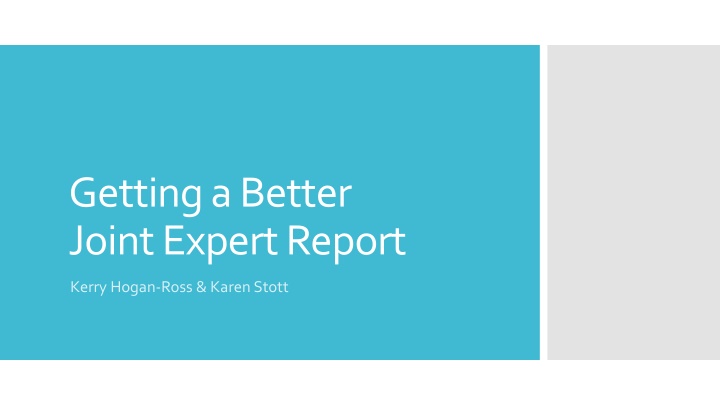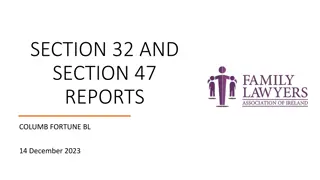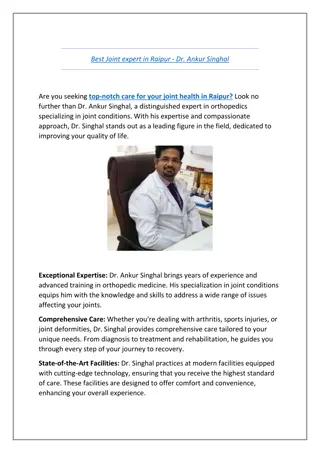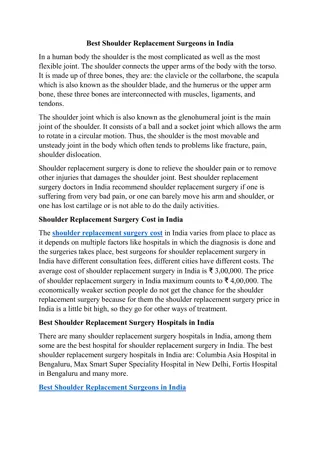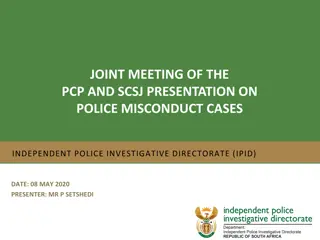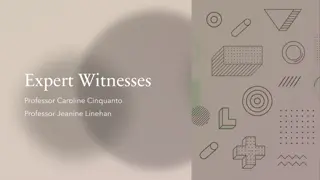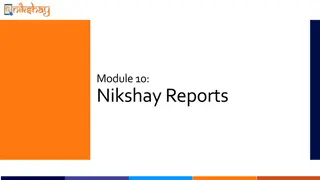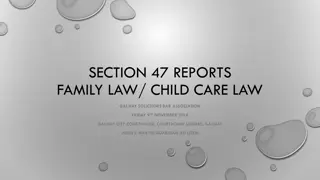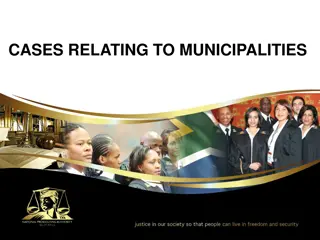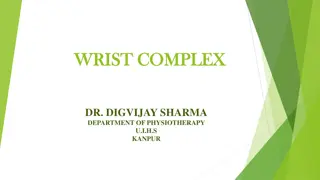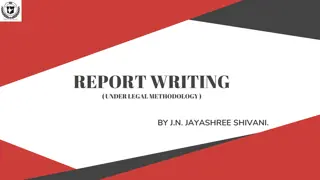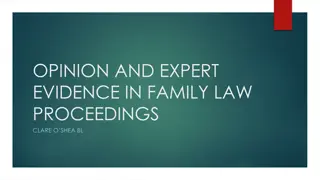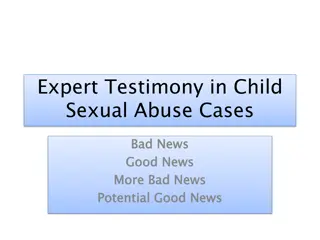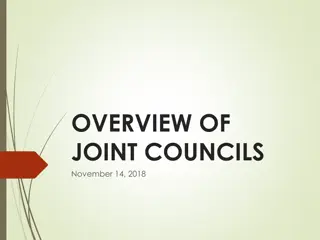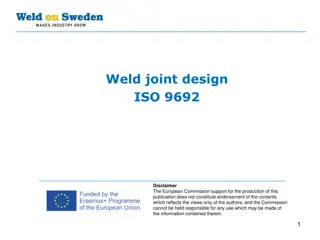Effective Strategies for Joint Expert Reports in Legal Cases
Joint expert reports play a crucial role in legal cases by narrowing down disputed issues, promoting settlement, and expediting trials. This article explores success factors, preparation tips, and the importance of following expert witness codes of conduct to ensure a constructive and efficient joint expert conference.
Download Presentation

Please find below an Image/Link to download the presentation.
The content on the website is provided AS IS for your information and personal use only. It may not be sold, licensed, or shared on other websites without obtaining consent from the author.If you encounter any issues during the download, it is possible that the publisher has removed the file from their server.
You are allowed to download the files provided on this website for personal or commercial use, subject to the condition that they are used lawfully. All files are the property of their respective owners.
The content on the website is provided AS IS for your information and personal use only. It may not be sold, licensed, or shared on other websites without obtaining consent from the author.
E N D
Presentation Transcript
Getting a Better Joint Expert Report Kerry Hogan-Ross & Karen Stott
The purpose of expert witness joint conferences Success factors How to prepare the questions are the thing Consequences of briefing early v late Why use a facilitator? Why use a stenographer? Just, quick and cheap resolution -? Overview A joint expert report can make or break your case. If you prepare for the conclave well you are likely to be ahead of your opponent.
To assist the court Narrow the issues in dispute Promote settlement Shorten the length of the trial To promote the Just, quick and cheap resolution of proceedings Purpose of expert witness conclaves
Expert Witness Code of Conduct (set out in Schedule 7 of the UCPR); Division 2 of Part 31 of the UCPR, (regarding expert witnesses and a joint report); and Practice Note No. SC Gen 11 (08/17/2005) regarding Joint Conferences of Expert Witnesses. Practice Note Civil 1 District Court NSW Practice Note SC EQ3, 55 Practice Note SC CL5, 37-40 Relevant Rules
Choice of expert Agreement on factual assumptions Agreement on questions Experts briefed sufficiently in advance with the same brief Questions are researched and concise / relevant Time allocated for the conclave is realistic Conclave date sufficiently in advance of report deadline Experts attend in person Experts are sufficiently prepared Experts adopt a constructive and collegiate approach Use of a facilitator! Success Factors
Onus on the Plaintiff to prove the case Conclaves are inevitable in a matter Mediation before Conclave may not be possible BEFORE briefing an expert: Comprehensive discovery of contemporaneous records Comprehensive witness statement which correlates with factual dates Ensure any factual assumptions required are rock solid Special Considerations ForPlaintiff Lawyers
Specialist expertise: Melchior & Orsv Sydney Adventist Hospital Ltd & Anor [2008] NSWSC 1282 Expert gone rogue: Thimmavav Lancashire NHS Foundation Trust - 30 January 2020, Manchester County Court Choice of Expert
Good Preparation and communication remember just, quick and cheap resolution Duty of parties to attempt to agree Goldsmith by her Tutor NSW Trustee & Guardian v Bisset NSWSC 2014, per GarlingJ Agreement on Factual Assumptions and/or Questions Where necessary to disagree on assumptions: Consider having 1 set but highlighting the alternate assumptions throughout Easier for experts to identify and address Makes for a more cohesive joint report
Experts briefed sufficiently in advance Experts are given the same brief Briefing the Experts Experts attend in person if practicable Experts are sufficiently prepared
The questions are as important as your initial brief to your expert. Questions should: - Go to the true issues in the case - Be researched properly first it's ok to consult with your expert! - Use correct and consistent terminology - Be clear and unambiguous - Not be repetitive - Not annoy the experts The Questions are Everything! Also: Consider whether the goal is Yes/No answers or detailed information
Questions should be: Researched properly first consult with your expert! Use correct terminology Case study re alleged failure to diagnose rectal cancer Questions referred to cancerous growth , tumour , pre- malignant polyp -interchangeably. The Questions are Everything! Example: Do you consider the plaintiff presented with any cancerous growth or pre-malignant polyp? Could the experts provide a yes / no answer? Example 2: a broad question producing an unexpected result: Would earlier diagnosis and treatment have ensured the patient s survival?
An example of a single question actually being more like 12 questions: In respect of each of the above consultations should a reasonable and competent (specialist doctor) in the position of the first defendant have arranged for further follow-up? Was the diagnosis by the first defendant adequate? Ought the first defendant have considered a differential diagnosis including cancer? The Questions are Everything! there were 4 consultations in issue, spanning over 2 years there were 13 questions put to the experts in full (like this) are yes/no answers expected here? Or detailed reasoning?
Time allocated for the conclave should be realistic 5 pages of assumptions, and multiple assumptions, with 20 questions that have multiple components to each one will take longer than a 2-3 hour conference. Timing Conclave date sufficiently in advance of report deadline What is the availability of the experts available afterwards to review, amend and sign the report?
Your experts opinion should not come as a surprise! Experts are prepared and not annoyed Greater likelihood that report can be completed immediately Minimal need to change report afterwards due to experts wanting to add to or change their comments Consequences of Briefing On Time v Late
True Stories It is ideal if Experts are co-operative and collegiate but . Look after your expert and your expert will look after you How a Facilitator can help
In a neutral and non-biased way, to facilitate an environment whereby the experts produce, in a timely and cost-effective manner, a joint report that assists the court. What is the Role of a Facilitator? That is, a report that complies with the Practice Note and the court s orders and is cogent, well presented, avoids repetition and answers the questions.
To guide & support the experts in their duty To manage power imbalances Why have a Facilitator? To ensure the experts address the questions To bring the joint expert report to completion in a timely manner don t under estimate how difficult this can be!
His HonourCampbell J ordered that a conclave of 3 Obstetric liability experts be re-convened because: Coffey v Murrumbidgee Local Health District [2017] NSWSC 1441 The joint report was not sensible or logical It was submitted with a summary cover sheet by SC Facilitator with the transcript of the conclave attached contrary to the Rules and to proper practice One of the liability experts had not been able to attend the original conclave
Legal expertise Expertise as a mediator / facilitator -able to manage strong personalities, encourage experts to adopt a constructive and collegiate approach Attributes of a good Facilitator Hands-on approach to herd cats and bring report to completion Well-organised and good administrative skills
Costs of late-adjourned conclaves Matters with multiple conclaves required Just, Quick and Cheap ? District Court matters where quantum is relatively modest Conclaves before or after ISC/Mediation? Conclaves right before Trial
Experts meet or conference call on their own and produce report. Not recommended but can be effective with experts very experienced in providing medico-legal reports, joint reports and giving evidence. Experts meet and/or conference call with facilitator with or without a stenographer transcript amended and draft report produced after the conclave. Experts meet and/or conference call with facilitator and stenographer. Answers inputted live and visible via lap tops or large screen throughout the conclave, first or even final draft available at end of conclave. Different styles of Conclaves
If experts are poorly prepared or the questions are poorly drafted you risk having an uncooperative, disengaged, angry expert - they can go rogue! A poorly prepared expert may have less ability to counter an unequal power balance, or difficulty in expressing a view. Key Messages: PPPP! A poorly prepared expert often leads to a delayed report, or a poor quality report. Poor preparation and putting an expert at a disadvantage is not just bad for the client, it is also a reputational issue for the solicitors. Thank You
